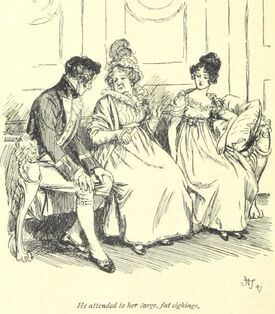| Clutching My Pearls is my ongoing blog series about my take on Jane Austen’s beliefs and ideas, as based on her novels. Click here for the introduction. |

In an earlier blog series, I critiqued the book, Jane Austen: the Secret Radical. To recap here, Dr. Helena Kelly, while acknowledging that Austen is sometimes comic, argues she is altogether more serious and critical than people realize. The reason people don't realize this is because Austen had to hide her criticisms of society because she lived "in a state that was essentially totalitarian." Kelly says Jane Austen was a writer who wanted to write seriously, critically, about injustice and women's rights, and the corruption of the state and church, but had to hide her message. Austen was really a secret radical.

So, what was Austen critiquing with her satire? In Jane Austen, the Secret Radical, Dr. Kelly claims to find the following themes hidden in Austen and further, she argues that these themes would have been controversial in Austen's day:
|
But the topics Kelly lists? She might have strengthened her case if she had presented actual examples of people charged with seditious libel for writing about abolition, primogeniture, land enclosure, dying in childbirth, or the unpredictability of human events. Mary Wollstonecraft wasn't prosecuted for writing the response to Edmund Burke. William Godwin wasn't prosecuted for writing Caleb Williams. Maria Edgeworth wasn't prosecuted for Castle Rackrent. All of these works are heavily critical of the status quo. Was anyone prosecuted for writing "about a world in which parents and guardians can be stupid and selfish, in which the Church ignores the needs of the faithful, in which landowners and magistrates... are eager to enrich themselves"? So far I haven't found any examples.
And if they were not actually arrested but were condemned socially? What if they were driven out of their professions and held up as pariahs? Well, we certainly have many instructive examples of people being shamed and cancelled today, for the noblest of motives, by the most virtuous people. Perhaps those people in the Regency period had their reasons, too.
- Mansfield Park is supposedly pro-abolition. The word “abolition” doesn't appear in Mansfield Park, but it is found In Emma, when Jane Fairfax and Mrs. Elton mention the slave trade.
- Northanger Abbey is supposedly about the terrifying reality that sex could lead to death in childbirth. But Austen jokes in the opening pages of the novel that Mrs. Morland didn’t die when giving birth to Catherine, as might be expected of a heroine’s mother. Nobody’s mother dies of childbirth in Northanger Abbey. In Emma, on the other hand, we have three people whose mothers die young—Emma Woodhouse, Jane Fairfax and Frank Churchill. (And death was used relentlessly by novelists of the day to clear the decks for their plots, to punish the wicked, or build pathos for the orphaned heroine.)
- But Emma isn’t about slavery or dying in childbirth, it’s about land enclosure. Kelly says there is a “preoccupation with land enclosure” in the novel. Yet, despite this preoccupation, the word “enclosure” doesn’t appear in Emma. Not once.
- It's mentioned twice in Sense and Sensibility. But Sense and Sensibility isn’t about land enclosure, it’s a protest against primogeniture, the practice of leaving the estate to the oldest son. Yet, heirs and inheriting feature in all the novels, such as in Pride and Prejudice, when Colonel Fitzwilliam says that younger sons can't marry where they like.
- But Pride and Prejudice isn’t about primogeniture, it’s about class distinctions. But Emma and Persuasion have plenty of explicit discussions about rank and class.
- But Persuasion isn’t about class distinctions. It’s about the uncertainty of human events. Although it is Emma who exclaims: "Was it new for any thing in this world to be unequal, inconsistent, incongruous—or for chance and circumstance (as second causes) to direct the human fate?"
| Thesis: Austen is advocating class overthrow in Pride & Prejudice. Me: But she isn't advocating class overthrow in Pride & Prejudice. Thesis: That's because if she said it openly, she'd be arrested. Me: So if she isn't saying it, how do you know that's what she meant to say? |
| In the third volume of my Mansfield Trilogy, the writer William Gibson gets in trouble for publishing a pamphlet that is critical of the government. I also feature the radical romantic poet, Percy Bysshe Shelley. Click here for more about my novels. |

 RSS Feed
RSS Feed